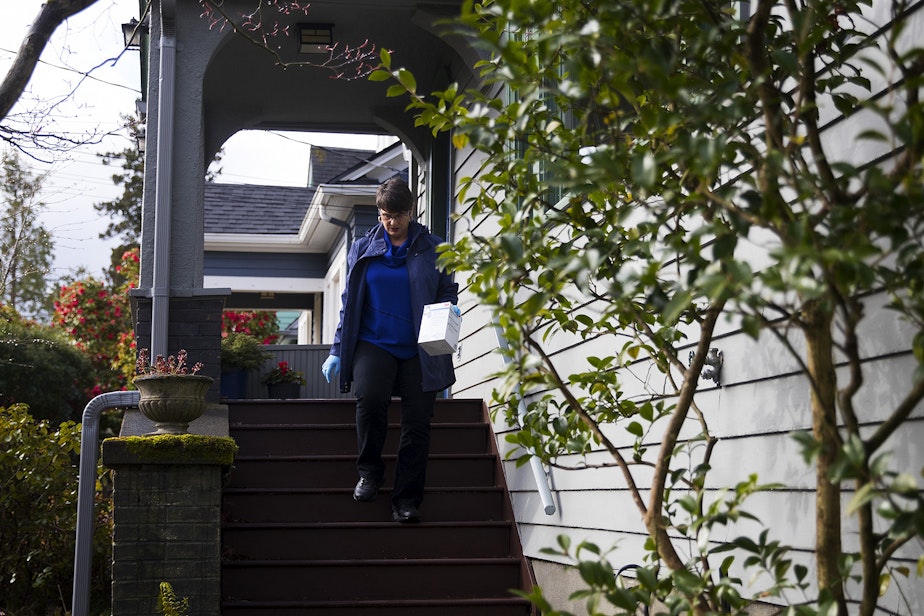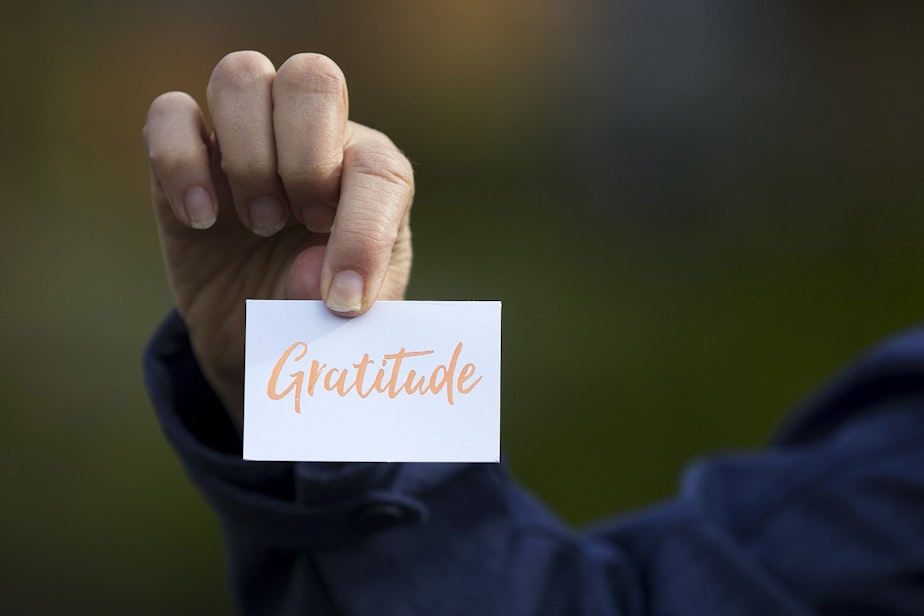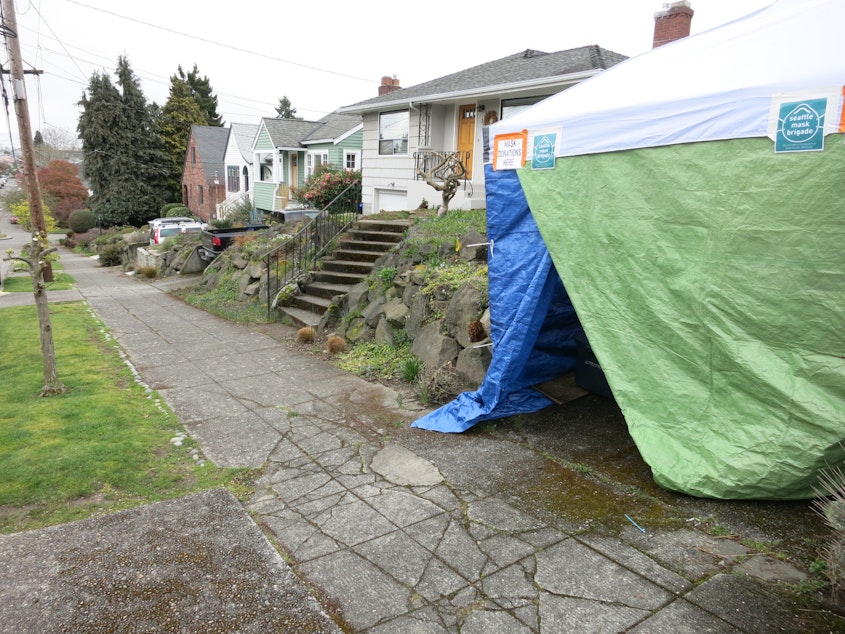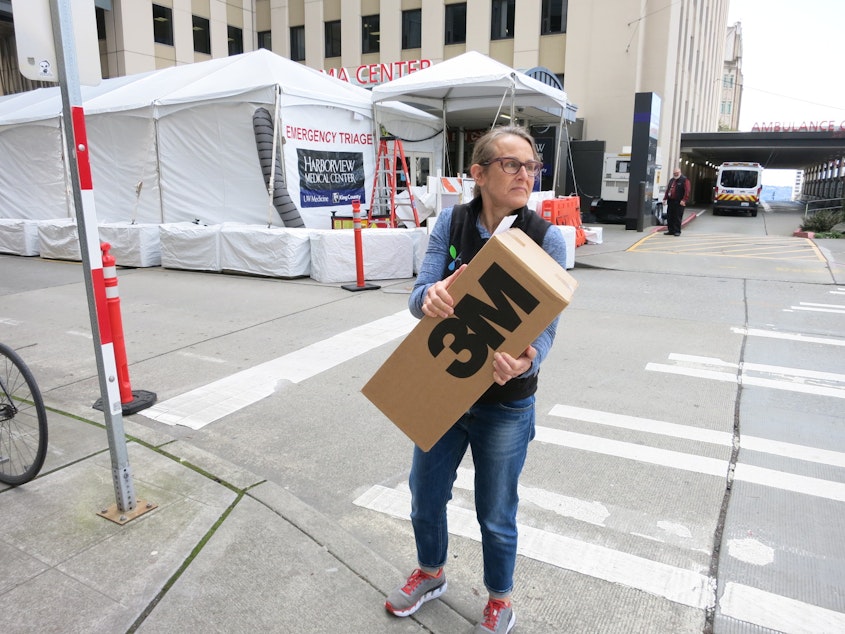Have masks leftover from wildfires, or a home project? The Seattle Mask Brigade will pick them up

Volunteers in Seattle are working to fill the needs of healthcare workers and others on the front lines of the pandemic, grappling with shortages of personal protective equipment.
The Seattle Mask Brigade works like this.
In the morning, volunteers like Dawn Lum make pickups. Lum grabs boxes of donated masks off doorsteps, and leaves a thank you note.
“It just says 'gratitude' in gold foil," she says of the thank you note. "And I just write in there, 'Thank you for donating your masks, Love Dawn, from the Seattle Mask Brigade.'"
Lum felt she needed to do something during this crisis. For work, she coordinates kidney research. Now on weekends and days off, she volunteers to drive from stop-to-stop in her white Prius.
Pickup drivers get a list by 9:30 p.m. the day before. It shows stops to pick up masks on their route. She visits up to 10 locations a day. Sometimes she gets one mask, sometimes more than 2,000. It’s all worth it.
Sponsored
“I guess the way I look at that is, what if it was your sister, or brother, or mother who was a healthcare provider who didn't have that mask?” Lum said. “Every one of these health care providers is a hero to me.”

Across the state and country, a lot of individuals, companies, and government agencies are trying get protective equipment to people who need it. Locally, the Seattle Mask Brigade is filling one niche.
They collect the small donations that are needed, but not accepted by other, larger donation drives. Then they distribute the goods quickly to frontline workers, within a day or even an hour or two.
In the past few weeks, the Seattle Mask Brigade has collected around 8,000 from over 450 donors with the work of around 100 volunteers.
Sponsored
“We're not a long term solution. We can't do high volumes. We can't provide 100,000 masks,” said Julianne Dalcanton, who started the local brigade. “We are providing what people have available; what they happened to buy during smoke season a couple of years ago or what they bought for a home improvement project.”
Like one box of N-95 masks. Maybe the owner took out a single mask and left the rest. Some places won’t accept those, but other groups don’t mind.
“No matter what people donate, we've been finding people who will take it,” Dalcanton said.
Dalcanton actually chairs the University of Washington Astronomy Department, but in mid-March she was talking with some friends over group chat.
They were horrified that healthcare workers were running out of masks, so they started brainstorming, and the brigade was born.
Now a network of volunteers operate it remotely from their homes throughout Seattle.

One logistics hub is in Greenwood at the home of Leah Friberg, who keeps a tarp-encased pop-up shelter in her front yard as a drop-off point.
Inside as sealed, repurposed totes from Friberg’s house – one still has an old homemade label on the side that says “pillows.”
In the morning, the drivers put their deliveries into the totes and Friberg retrieves, sorts, labels, and returns them for the afternoon drivers to pick up.
Sponsored
Every day Friberg does some dizzying matchmaking using constantly updated, interlinked online forms and spreadsheets.
She connects what’s been donated and delivered to what’s needed where – hopefully at the right time.
“It's the balancing act of when do I have enough masks in and enough requests that are firmed up that I can then ping our drivers who have signed up for the day to say, ‘Okay, Sarah, I'd like you to go here. Bill, I'd like you to go there. Here's where you need to pick up the masks. Here's where you need to take them. Here's how many…’”
All while Friberg takes care of two kids and works full-time from home in marketing.
All this work has made the Seattle Mask Brigade part of the local infrastructure of collecting and distributing medical supplies. The City of Seattle is even leaning on the brigade to pick up smaller donations and opened boxes of goods. The Seattle Mask Brigade is also advising people in other cities across the U.S. how to start their own collection efforts.
Sponsored
Friberg thought that by now, more nationwide manufacturing would have made the brigade obsolete, she said.
“Honestly, we shouldn't be having to do this. We shouldn’t be having to raid our pantries, when we’re what, one of the greatest manufacturing nations on earth,” Friberg said.
In the afternoon, volunteer drop-off driver Sarah Cook works a shift, carrying a large paper bag down the hall of a medical building on First Hill. She walks up to the reception counter at an ultrasound clinic, and drops off 100 surgical masks.
“Hi, these are masks from the mask brigade,” Cook says.
The brigade has donated to a wide range of places – from Swedish and Virginia Mason hospitals, to food banks and social service agencies, such as Community House Mental Health Agency, which houses people with mental illness.
No residents have gotten Covid-19, administrator Amanda Wager said, but she wanted to be prepared so she asked the brigade for masks.
“I figured supplies were limited and right now we don’t need them, hopefully we won’t need them but I’m just being realistic,” she said. “I just wanted to get them for some staff and for residents when they start getting the cough or something.”
Community House is trying to do as much social distancing and cleaning as possible, Wager said.

Just after 1 p.m., Sarah Cook reaches her last stop of the day delivering supplies for the brigade: the Harborview Emergency Department.
Outside, Cook runs into her friend, who’s a doctor and they chat for a second.
“Bye, thanks for what you’re doing, you’re awesome,” her friend says.
“Thanks for what YOU’RE doing!” Cook responds.
At the triage tent, Cook asks for directions from a worker who’s so covered in protective equipment, you can only see her eyes.
“Masks for donation? You go right to the screening table.”
Cook walks past the loud, humming triage tent and through the sliding glass doors to the screening table, a folding table with signs, workers and a security guard.
“Hi, I have masks for donation.”
“Thank you!”
She drops off 80 N-95 masks and walks back toward her car. The recipients are always so appreciative, she said.
“It’s a good feeling,” Cook said. “It’s a good feeling to be able to help and getting that response.”
Normally, Cook is a freelance corporate event planner, but these days, she has more time on her hands.
Now, for the rest of the day, Cook is shifting focus to her next project: figuring out how to construct medical face shields by hand.




